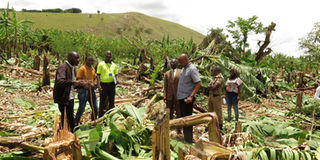Government, NGOs rush to save wetlands in Ntungamo

Cut down. Ntungamo Resident District Commissioner George Bakunda (centre) and officials from Ministry of Water and Environment inspect some of the razed plantations in Kakingora Wetland in Rweikiniro Sub-county on October 7. PHOTO BY PEREZ RUMANZI.
What you need to know:
- The Ntungamo Resident District Commissioner, Mr George Bakunda, who led the operation with ministry officials and police, says they are not going to listen to any more pleas by encroachers.
- Mr Messach Kahinda, the Rweikiniro Sub-county chairperson, says with the ministry coming on board, people will fear going to wetlands because hitherto local enforcers would be bribed or disrespected.
At least four wetland restoration projects are running in Ntungamo District following encroachment and degradation of the marshlands by human activities.
Wetlands cover 3.4 per cent of the district total land cover of 2,051.4 square kilometres. Water bodies cover 0.2 per cent and are surrounded by wetlands.
The projects are: Wetland Restoration Mission being implemented by Abendagano Development Foundation (ADEFO), and Building Resilient Communities, Wetland Ecosystems and Associated Catchments in Uganda being done under the United Nations Development Programme.
The others are: Wetland Restoration and Demarcation being implemented by Ministry of Water and Environment, and Maziba Water Catchment Restoration funded by Sahara Sahel and the Resilience Fund.
The projects target restoration of heavily degraded wetlands of Nyabihoko, Kamira, Kyangara, Kakingora-Rufuha, Kaita Nturegye, Ruhanga, Nyamukana, Nyaruteme, Kyarubuta -Kashojwa, Kyamwasha, Kabobo-Riero-Bizi and Kacwamba–Kakitumba.
Challenges
Ntungamo District natural resources officer Dinah Tumwebaze says while the district has had the strong will to stop the wetland degradation, they lacked resources.
She says the coming of these projects is a very big blessing.
“As the district, our budget for the department responsible for wetlands is too little to mount serious and sustainable fight against those degrading wetlands. At times enforcers have been threatened such as in Nyabihoko and have run for their lives. We hope for the better and wetlands will be restored,” Ms Tumwebaze says.
Ms Tumwebaze adds that the district council recently passed a wetland and other land management ordinance and is awaiting confirmation by Solicitor General.
The law will be useful in enforcement of environmental protection measures.
Mr Daniel Businge, the Southwestern regional wetlands officer in the Ministry of Water and Environment, says the organisations have for the last three years been preparing people to leave wetlands.
“We have done a lot of work by mobilising communities and sensitising them on the need to quit wetlands and give way for restoration. Most had promised us they would quit but we are seeing more people instead encroaching on the wetlands newly. Now, we are embarking on eviction and we hope to be successful,” Mr Businge says.
On October 7, banana plantations and eucalyptus trees were cut down and drainages were blocked in an effort to restore wetlands in Rweikiniro and Ruhaama sub-counties.
The Ntungamo Resident District Commissioner, Mr George Bakunda, who led the operation with ministry officials and police, says they are not going to listen to any more pleas by encroachers.
Mr Messach Kahinda, the Rweikiniro Sub-county chairperson, says with the ministry coming on board, people will fear going to wetlands because hitherto local enforcers would be bribed or disrespected.
Dr Peninah Beinomugisha, the chairperson of ADEFO, however, says people must be taught how to use wetlands in a sustainable matter.
“If no proper sensitisation is carried out, even the restored wetlands shall be depleted again. In real sense, we should engage the communities that they even become real leaders in restoring these wetlands,” Dr Beinomugisha says.




